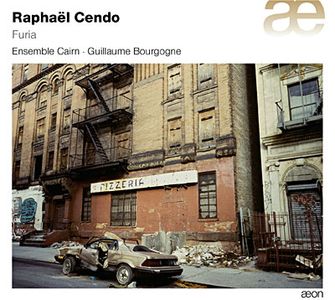
Ovdje pak klasični instrumenti zvuče kao da su field recordings.
Potpuno suprotno od onoga što očekujete od njih.
The Belgian percussionist Tom De Cock plays Raphaël Cendo's 2002 work scratch data. I came upon this video after listening to Cendo's rigorously alarming piece Introduction aux ténèbres, a setting of texts from the Book of Revelation, on the NEOS CD Donaueschinger Musiktage 2009 (vol. 2). At a CDMC conference in 2008, Cendo joined Franck Bedrossian and others in discussing issues of excess, saturation, monstrosity, chaos, mutilation, and, naturally, black metal. Introduction aux ténèbres partakes of such bitter fruit; scratch data finds the composer in a much mellower mood. - Alex Ross
classical-music-online.net/en/production/37169
Einführung ins Dunkel. Die Musik von Raphaël Cendo

Rokh I
One of the most memorable performances at HCMF 2013 arose out of what appeared beforehand to be pretty restricted forces: bass flute, violin, cello & prepared piano, members of the French Ensemble Linea. Yet in Rokh I, the first of a three-part, 30-minute cycle, Raphaël Cendo enables this quartet to become one of the most startlingly elemental pieces of chamber music i’ve ever witnessed.
In Huddersfield, of all places, one hardly expects instruments to be played only in a traditional fashion. But Rokh I goes further; by avoiding almost anything resembling convention, Cendo practically redefines what music is, turning it on its head in fact. Cendo’s extended techniques seem like nothing of the kind, but merely the most basic & fundamental—even obvious—ingredients for the intensely focussed, self-referential entity that is Rokh I. The work’s point of inspirational origin is the terrifying mythological bird of prey found in Indian, Persian & Asian literature (perhaps most memorably in the One Thousand and One Nights). Cendo establishes the sonic credentials of the creature in the most dazzlingly vivid way, a counterpoint of violence formed from a myriad gestures, slides, twangs, thwacks, ruffles, slaps, heavily compressed pitches, grindings, pops, clusters & whooshes. It’s as though we’ve become the miniaturised inhabitant of the great creature’s nest, confronted by activity on a massive & potentially very destructive scale.
Having established such a radical syntax & tenor, Rokh I doesn’t deviate significantly from this through its 18-minute duration. There are numerous episodes & asides, passages where the music wanes into a more sparse & delicate demeanour. But none of this detracts from the work’s tense momentum: the strings let off a volley of soft ricochets & indistinct glitchy harmonics, alongside ominous flutterings & taps from the flute & muted piano tremolos. Indeed, these periods of restraint are often answered by overwhelming aggression, either by the ensemble allying themselves into brawling pairs or by uniting to turn on the very material itself. This rupturing & reforming of the four players is both entertaining & seriously effective, thwarting one’s attempts to establish too literal a narrative vision for the work, yet never for a moment denting its vividness. The back & forth between complexity & simplicity becomes more rapid as the work progresses, reaching extremes: a lengthy, practically motionless section instigates a hectic reaction, & the whole ensemble becomes frantic, crashing down in the wake of an onomatopoeic flute call & a sibilant whisper.
There’s a lot to get excited about during HCMF, & Rokh I really does exemplify the best of it. As a reinvention of chamber music it’s exhilarating enough, but this performance—as i mentioned in my original review—features some truly astonishing playing, particularly from pianist Anna D’Errico, who moved in, out, on & around her instrument with the speed & energy of an acrobat. And if the piece whets your appetite as much as it did mine, a recording of the complete cycle is available (Amazon/iTunes). - 5against4.com/
Raphaël Cendo's music seizes us bodily or, more precisely, captures all our senses!His biography is a legend. Upon graduating from the Paris Conservatoire, the jury dared not grant him his full legitimacy. The institution bestowed only a second prix, but his music was already first. He had turned his back on his peers quite some time ago and chosen shortcuts at the risk of being misunderstood. The radical nature of his thinking asserted itself, and he invented the saturation. The principle of this music is 'a thwarting of the limit, thanks to an excess of energy'. Releasing the instrumental energy, bringing the performer's body into the field of the composition, making the concert no longer a simple disaffected representation but a basic musical act, a sound ritual in which the performer is the officiant. This calls for mad virtuosity from the performers. The sound is metamorphosed. It is no longer a matter of planning but of losing oneself; it is no longer a matter of organising but of cutting a path in an unstable, wild and unknown world, for what is written as much as for he who plays it and he who receives it. - www.outhere-music.com/
Nema komentara:
Objavi komentar